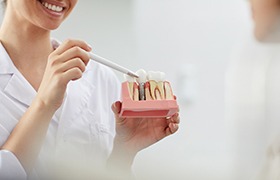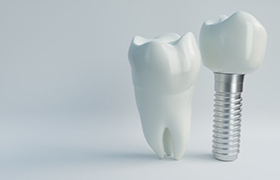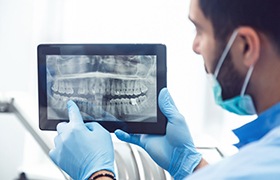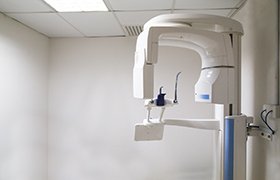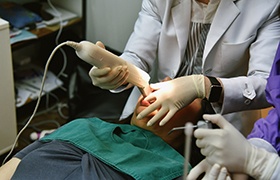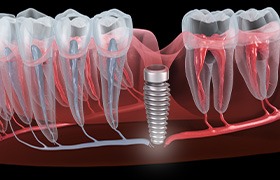What Are Dental Implants?
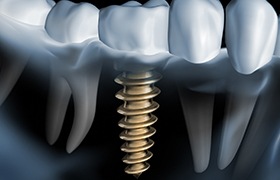
Most traditional tooth replacements only bring back the crown (top) of a tooth, but instead, dental implants
rebuild both the root and the crown. The implant itself is a small titanium post that is
placed directly into the jawbone by a partnered oral surgeon. Then, it fuses to the surrounding bone and tissue
in a process called osseointegration. From there, a metal abutment is affixed to the implant, which is used to
secure a custom-made dental crown. Multiple implants can also hold a dental bridge or denture.
Dental implants essentially act just like the roots of the teeth you’ve lost. As a result, they deliver
reliability, durability, and longevity that traditional methods simply cannot. They’re able to look and
feel just like natural teeth. That’s why when a patient comes to us wanting to replace missing teeth,
dental implants are usually our first suggestion.
Am I Too Young to Get Dental Implants?
Dental implants are typically not recommended for patients younger than 18, as their jaws may not be fully
developed. In general, men’s jaws take longer to develop than women’s jaws. If dental implants are
placed before the jaw is finished growing, it could interfere with further bone development and potentially
result in complications. If you are a teenager or young adult and want to replace missing teeth, talk with Dr.
Blake, an experienced implant dentist in Beverly, about which restorative treatment may be best for you.
How Long Does It Take to Recover from Dental Implant Surgery?
While every case is different, you will likely be able to resume your normal activities the day after implant
surgery. Take prescribed or over-the-counter pain medication as directed to reduce any discomfort. In general,
bleeding should stop after the first couple of days, and swelling should stop after three to four days. Be sure
to avoid strenuous exercise for the first week or so, as it could delay healing. While recovery from implant
surgery can be swift, remember that it can take up to six months for your implants to fully fuse with your
jawbone.
Do Dental Implants Decay?
No, dental implants and the restorations they support are not made of enamel, so they cannot get cavities.
However, the gums around an implant can still become infected. In addition, your remaining natural teeth are
still susceptible to tooth decay. In order to prevent cavities and avoid infections that could lead to implant
failure, be sure to continue practicing excellent oral hygiene.
What Can Cause Dental Implants to Fail?
While uncommon, dental implant failure usually occurs for one of two reasons:
- Peri-implantitis – A form of gum disease that can damage the bone and gums
supporting a dental implant. Peri-implantitis typically develops due to poor oral hygiene.
- Failed osseointegration – Sometimes implants fail to integrate with the
surrounding bone, especially when patients do not have a strong, thick jawbone structure.
Other causes of dental implant failure may include chronic teeth grinding, tobacco use, poor oral hygiene, and
certain medications. Diabetes, cancer, osteoporosis, autoimmune disorders, and certain other health conditions
may also reduce the chances of successful implant treatment.
It’s important to keep in mind that dental implants have an extremely high success rate of over 95%.
Moreover, you can rest assured that your dentist will provide guidelines for minimizing your risk of implant
failure.
Do Dental Implants Make You Look Younger?
Yes! While it may sound too good to be true, dental implants in Beverly can make you appear younger and more
vibrant. The force of biting and chewing spreads through the roots of your teeth to stimulate your jawbone. When
teeth go missing, the jawbone loses that stimulation and begins to deteriorate. Without a full jawbone to
support your facial structures, you may eventually appear more wrinkled, with a sunken-in face and fine lines
around your mouth. Dental implants, however, stimulate the jawbone by replacing the missing tooth root
structure, preventing bone deterioration and helping you retain a more youthful appearance.
How Long Do Dental Implants Last?
You can expect your dental implants to last anywhere from several decades to a lifetime. Of course, the lifespan
of your restorations will depend heavily on your oral health and lifestyle habits. For instance, you’ll
still need to maintain good oral hygiene and care for your implants just as you would your natural pearly
whites. This means you should brush for two minutes twice a day, floss daily or after every meal, and rinse with
mouthwash frequently. Visiting our dental team for routine checkups and cleanings every six months will ensure
that we can catch and address any developing issues before they become a problem down the road. Even though your
dental implants will be durable, you’ll also want to avoid chewing on anything too hard, crunchy, or
sticky as well as refrain from using your teeth as tools.
Does Getting Dental Implants Hurt?
Similar to most other extensive dental treatments, our team will make sure to completely numb your mouth before
starting any work on your implants. Although you shouldn’t feel any pain during your procedure, you may
experience mild soreness, sensitivity, or discomfort for several days after your appointment. Fortunately, these
symptoms are usually short-lived and can easily be managed with over-the-counter pain relievers. You can also
apply a cold compress to the outside of your mouth to alleviate discomfort and minimize any swelling. However,
if your sensations persist after a few days or worsen, be sure to contact us for help.
Will I Have to Take Off Work for Dental Implant Surgery?
Most people will only need to take one or a couple of days off of work to undergo dental implant treatment. This
may change depending on each patient’s case. Those with jobs that are more physically demanding will
likely need to take at least three or even four days off so that they can have plenty of rest for recovery.
Heavy exercise or strenuous activities can divert blood away from the surgical site, delaying the healing
process significantly. To avoid any complications, you might consider scheduling your procedure at the end of
the week, like on Thursday or Friday, so that you can have more time to relax on the weekend.
Can I Get Dental Implants If I Smoke?
While it may be possible to get dental implants if you smoke, you’ll have a much higher chance of failing
the treatment. Firstly, smoking or chewing tobacco (or even vaping) can cause your mouth to dry, which can
disrupt your healing process and your implants’ capacity to bond with your jawbone. This habit can also
result in dry socket—a condition that affects your surgical site and may dislodge the blood clot that is
supposed to form around your implants. This is a great opportunity to start quitting smoking altogether, and our
team can offer the resources, guidance, and support to help you. However, if this isn’t possible, then we
recommend that you at least quit two weeks before your treatment and wait about two or three months after for
the best results.

 Over the past three decades, dental implants have become the premier way for dentists all around the world to
replace any number of
Over the past three decades, dental implants have become the premier way for dentists all around the world to
replace any number of 
